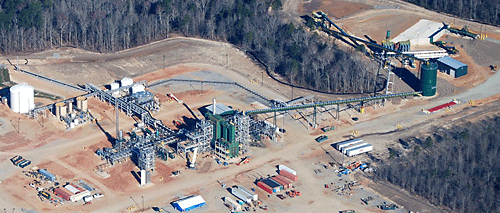Range Fuels Starts Commercial Cellulosic Methanol Production at Soperton, Ga.
 Print this article | Send to Colleague Print this article | Send to Colleague
Range Fuels, Broomfield, Colo., USA, reported this past week that its commercial cellulosic biofuels plant near Soperton, Ga., has started production of cellulosic methanol using non-food biomass in the initial phase of operations. The first phase of the Soperton Plant operations employs Range Fuels’ two-step thermochemical process, which uses heat, pressure, and steam to convert non-food biomass, such as woody biomass and grasses into a synthesis gas composed of hydrogen and carbon monoxide. The syngas is then passed over a proprietary catalyst to produce mixed alcohols that are separated and processed to yield a variety of low-carbon biofuels, including cellulosic ethanol and methanol.
The cellulosic methanol produced from Phase 1 will be used to produce biodiesel, ultimately displacing diesel oil in transportation fuel markets. It may also be used to displace diesel in heating applications, used as a fuel additive in gasoline-powered motor vehicles, or used to power fuel cells. Range Fuels plans to begin production of cellulosic ethanol from the plant in the third quarter this year. The cellulosic ethanol will meet ASTM standards for fuel-grade ethanol and will be used to displace gasoline in local and regional transportation fuel markets.
"We are ecstatic to be producing cellulosic methanol from our Soperton Plant, and are on track to begin production of cellulosic ethanol in the third quarter of this year," David Aldous, Range Fuels’ president and CEO, said. "This milestone is a giant step in overcoming the technological and financing challenges facing the commercialization of cellulosic biofuels and positions us extremely well to expand production of cellulosic biofuels. Additionally, with the first U.S. commercial production of cellulosic biofuels from non-food biomass, Range Fuels has taken a giant step in delivering on its vision of offering solutions to the pressing global challenges of energy independence, the environment, and the economy."
The Soperton Plant will initially use woody biomass from nearby timber operations, but plans to experiment with other types of renewable biomass as feedstock for the conversion process, including herbaceous feedstocks such as miscanthus and switchgrass. Range Fuels plans to expand the capacity of the plant to 60 million gal of cellulosic biofuels annually with construction to begin next summer. The Soperton Plant is permitted to produce 100 million gallons of ethanol and methanol each year.

|
|

